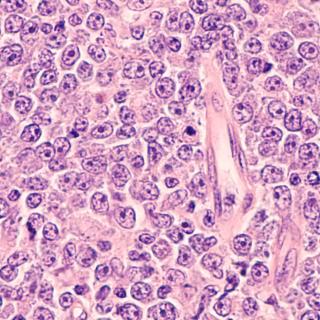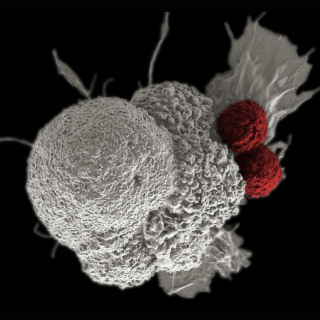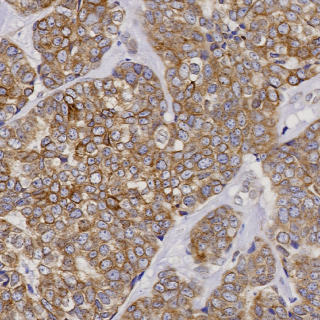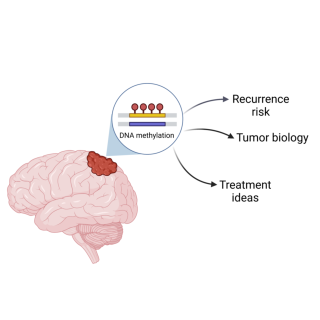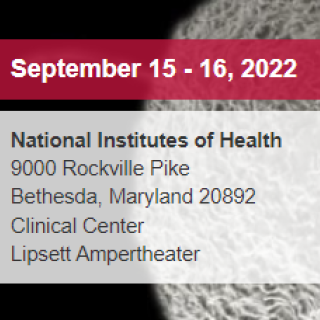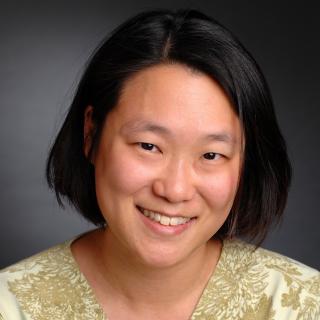News and Events
Proteins Released from the Nuclei of Dying Cancer Cells Promote Tumor Growth
Material released from dying cancer cells, known as tumor cell nuclear expulsion products (TuNEPs), contains specific proteins that promote the growth of neighboring cancer cells. Targeting these proteins could lead to new treatments that hinder cancer spread and improve patient outcomes.
Read MoreNew insights into the origins of an aggressive form of lymphoma
A new study sheds light on the origin of an aggressive subtype of diffuse large B cell lymphoma (DLBCL). The findings could help researchers develop more targeted therapies for this form of blood cancer.
Read MoreBacteria inside lung tumors concentrate within cancer cells
Researchers discovered that tumor-promoting signals are elevated in lung tumor cells with high concentrations of bacteria. These findings support the idea that reducing bacteria in the lungs might be beneficial for patients with lung cancer.
Read MoreImmune receptors recognizing mutations in p53 could guide immunotherapies for solid tumors
CCR scientists have assembled a library of immune receptors that direct T cells to target cells with mutations in p53, the most commonly mutated gene in human cancers.
Read MoreCCR postdoctoral researcher awarded Fulbright to study HPV and cervical cancer in Africa
Tsion Minas, Ph.D., is a recent recipient of a Fulbright U.S. Scholar Award. She joined the Laboratory of Human Carcinogenesis in 2016 to work with Senior Investigator Stefan Ambs, Ph.D., M.P.H., and study the molecular nature of cancers in African populations. In this Q&A, she shares her passion for closing disparity gaps in health research and how she plans to build upon her Fulbright work in the future.
Read MoreA protein predicts poor breast cancer survival for women of African descent
CCR and Columbia University researchers have discovered that large amounts of the gp78 protein in breast cancer tumors predict worse outcomes for patients of African ancestry. Their findings provide some new understanding of a significant health disparity in breast cancer.
Read MoreNew way to classify meningioma brain tumors suggests potential treatments
Two studies have found a new way to classify meningioma, a type of tumor that forms in the outer covering of the brain. Kenneth Aldape, M.D., Chief and Senior Investigator of the Laboratory of Pathology, speaks about how the new grouping system may help predict whether a patient’s tumor will grow back after treatment and may reveal new treatment possibilities.
Read More2022 Cancer Immunology and Immunotherapy Conference: Discovery to Mainstream Oncology
Registration and abstract submission is now open for the 2022 Cancer Immunology and Immunotherapy Conference: Discovery to Mainstream Oncology.
This two-day national conference provides a venue for scientists world-wide to exchange the latest information on the immunotherapy of cancer. We are looking forward to an exciting forum for discussion and debate on the current understanding of cancer and immunology and immunotherapy.
Sessions include:
- CAR T-Cell Based Immunotherapies
- Cell Therapy for Solid Epithelial Cancers
- Principles of Checkpoint Modulators
- Clinical Applications of Checkpoint Modulators
- Microbiome and Immunotherapy
- Factors Influencing the Success of Immunotherapy
- Innovative Approaches to Immunotherapy
Clinical trial researches immunotherapy for recurrent thymoma and thymic carcinoma
A clinical trial led by Arun Rajan, M.D., Senior Clinician in the Thoracic and GI Malignancies Branch, is researching treatments, including immunotherapy, for recurrent thymoma and thymic carcinoma.
Read MoreSung-Yun Pai selected for Hedwig van Ameringen Executive Leadership in Academic Medicine® (ELAM) Program
Sung-Yun Pai, M.D., Chief of the Immune Deficiency Cellular Therapy Program, was selected for the Hedwig van Ameringen Executive Leadership in Academic Medicine® (ELAM) Program for Women at Drexel University College of Medicine. The ELAM® program is dedicated to developing leadership and management skills in healthcare and is designed for senior-level women leaders interested in advancing hospitals and healthcare systems.
Read MoreCelebrating Asian American, Native Hawaiian, and Pacific Islander Heritage Month: A Conversation with Lilian Yang, M.B.A.
Lilian Yang, M.B.A., is the Senior Branch Manager in the Neuro-Oncology Branch (NOB). She is originally from Hawaii and identifies as Chinese American. In this Asian American, Native Hawaiian, and Pacific Islander Heritage Month Q&A, she talks to us about the many places she has lived, some valuable business school advice, and the need for Asian representation in leadership roles.
Read More
